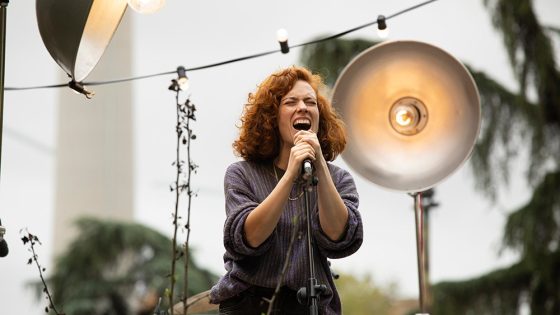Spanish director Jonás Trueba wants you to celebrate the endings, not just the beginnings.
That includes the demise of a serious relationship, because Ale and Alex (Itsaso Arana and Vito Sanz) have been together for 15 years. Now, they want only two things: to go their separate ways and to have a proper fiesta.
“The idea of a ‘separation party’ can be scary, but I just kept hearing about it. I even suggested it to a friend of mine, but every time, people’s faces just drop. You can see fear creeping in. It’s crazy and silly, and at the same time, it could be something beautiful. It’s a great idea for a film, if not for real-life.”
In “The Other Way Around,” premiering at Cannes’ Directors’ Fortnight, the couple in question still has a lot of affection for each other.
“It’s a love story, but another kind of love story,” he stresses.
“Everyone has gone through a breakup and many shared their experiences with me. The scene when they are going through their books, dividing them, feels very real, but I didn’t have to interview random people on the street to find these small details. We’ve all been through it.”
“It’s sad, but they are trying to go through this experience with a smile on their face. Maybe organizing this party is their way of doing something together? For the first time in a long time and also for the last.”
Once things are in motion, Ale and Alex have to convince others it’s a good idea. Repeating the same “pitch,” usually word for word.
“The first reaction is always surprise. They have to assure their friends everything is fine, that they are fine. It’s funny, because think about it: You are already going through a breakup and then you have to comfort other people as well,” he laughs.
For Trueba, gentle humor – and kindness towards his characters – is important.
“It’s part of my cinematic education and I can find it in so many films I love. As a viewer, I also prefer comedies like those of Woody Allen. Sometimes, subtlety works much better than a big joke,” he says.
“Violence, tragedy… It’s already everywhere. [Lithuanian filmmaker and poet] Jonas Mekas, who is one of my biggest references, also in life, said that ‘the evil and the ugliness will take care of themselves; it is the beautiful and good that need our care.’ It’s my mantra.”
Another rule he lives by? Stay close to what you know.
“Places, spaces, characters. I really think you can make cinema this way – you don’t always need spectacular scenery and earth-shattering events. Also, Ale is a director and Alex is an actor. When it comes to our job, sometimes it doesn’t end. You get to the point where there is no difference between reality and fiction. I am always thinking ‘in cinema.’ It’s an illness, but it can also be fun.”
“The Other Way Around,” while modest, marks Trueba’s biggest undertaking to date after “Every Song is About Me,” “The Romantic Exiles” or “The August Virgin.” But he still insists on working with regular collaborators, and fast.
“In the film, this couple says: ‘We have to do it quickly.’ It’s an interesting reflection, also on creation. Spending years on a single idea would be a nightmare to me, even though that’s how it usually works in this industry,” he says.
The film is produced by Trueba’s label Los Ilusos Films and co-produced by Les Films du Worso. Sales are handled by Memento International. Trueba co-wrote the script with Arana, herself a successful director, and Sanz.
“The idea is to work independently. I prefer to work with a small budget, small crew and with the people I know. I decided to make this film in December – in January, I was already finishing the edit.”
Trueba grew up in a cinematic family and now cast his father Fernando Trueba, an Oscar winner for “Belle Epoque” and Oscar-nominated for “Chico and Rita,” but the glamorous part of the job still doesn’t come easily to him.
“I hate it,” he smiles.
“I am not an outsider or some madman, and I can survive on the red carpet, but my only aspiration is to make films with my friends, in a positive environment. That’s all.”
Source Agencies



